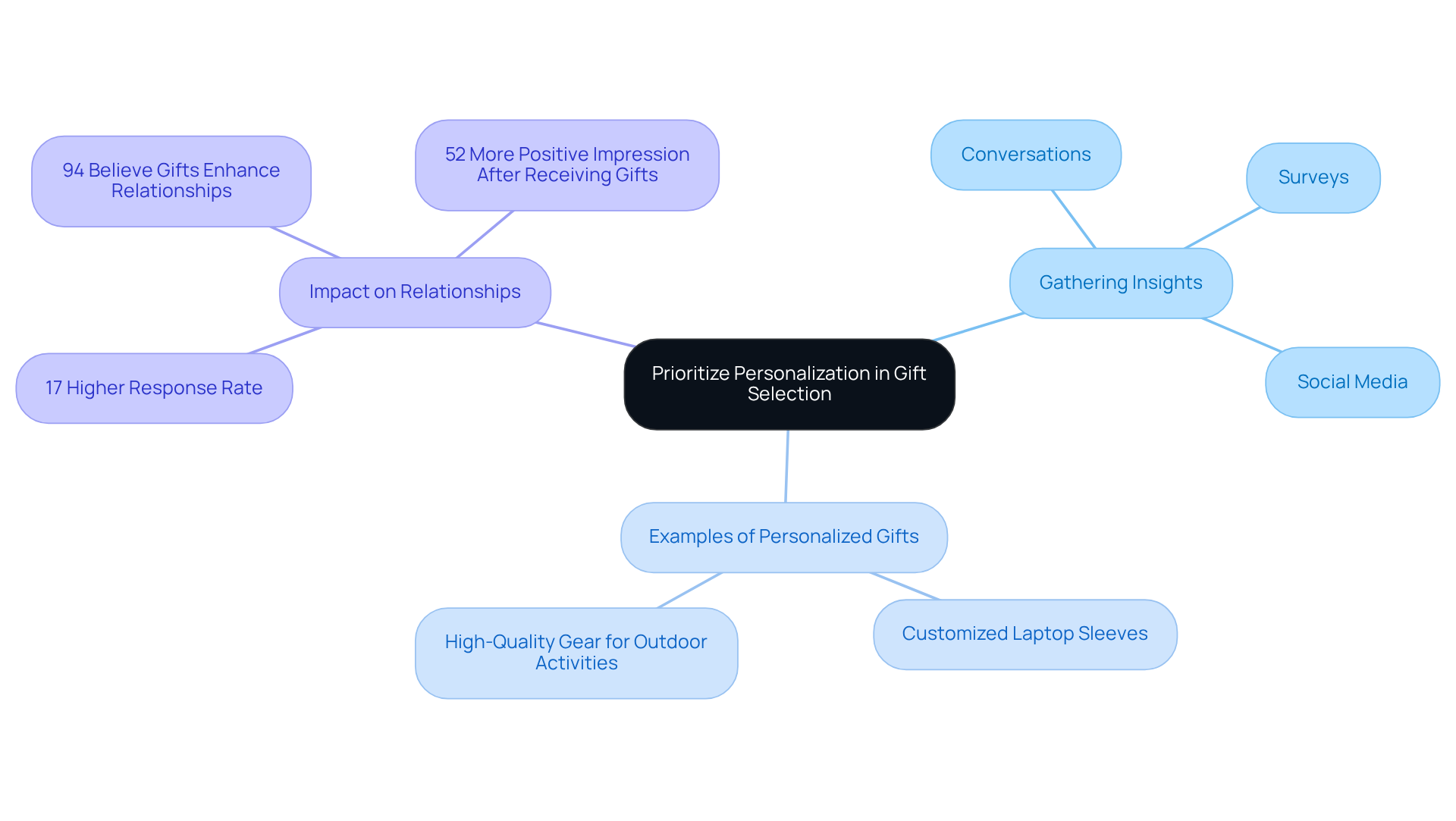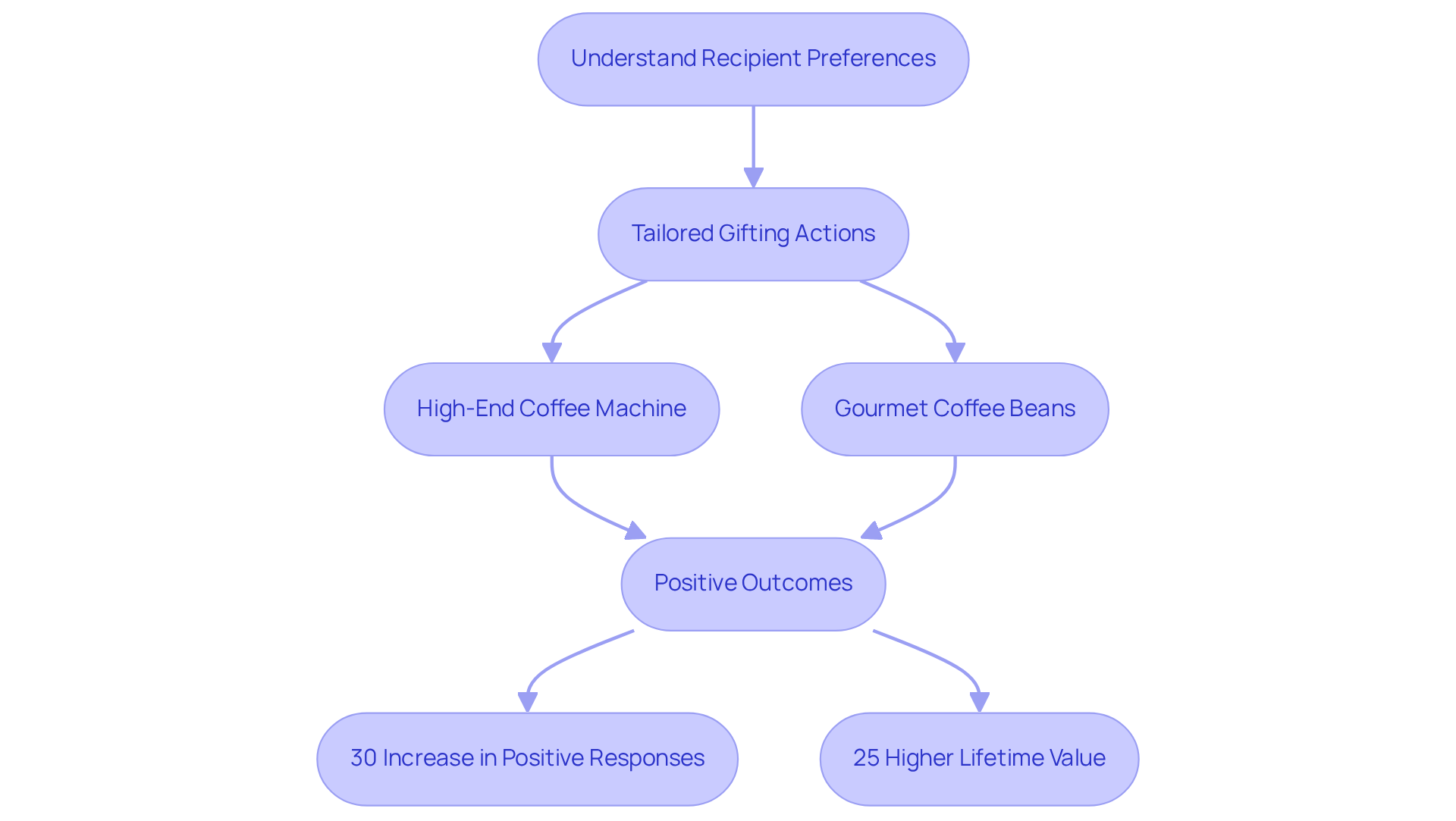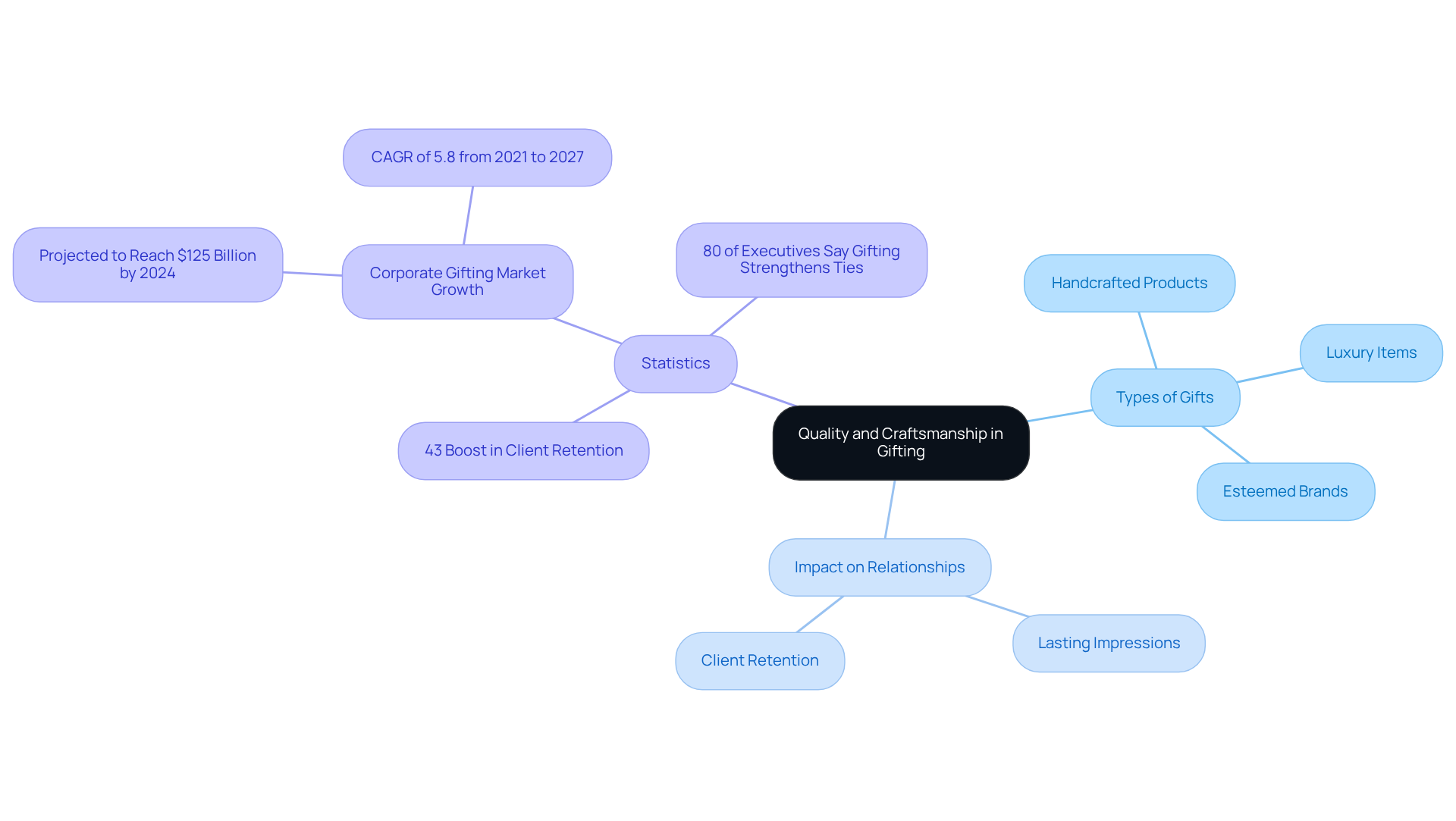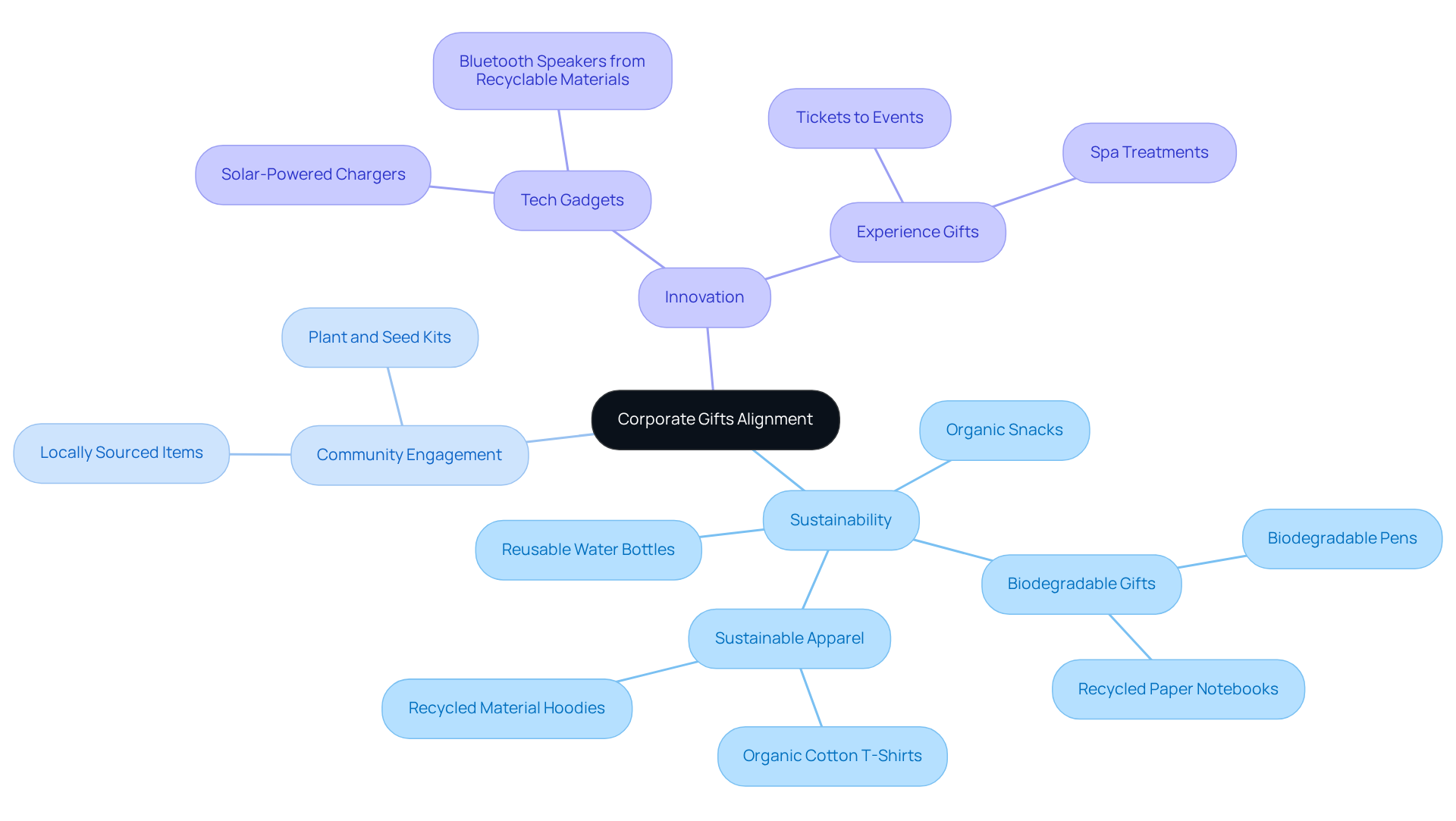Overview
The article examines four effective strategies for personalizing corporate gifts, a vital approach to strengthening business relationships. By understanding recipient preferences and prioritizing quality, businesses can create memorable gifting experiences. Aligning gifts with corporate values not only enhances customer loyalty but also satisfaction. Statistics demonstrate the effectiveness of these strategies, revealing increased positive responses and retention rates. This compelling evidence underscores the importance of thoughtful gifting in today’s competitive market.
Introduction
In the competitive landscape of corporate gifting, personalization has emerged as a game-changer. Businesses prioritizing tailored gifts not only enhance emotional connections with their clients but also foster loyalty and satisfaction. Yet, a challenge persists: how can companies effectively discern and incorporate individual preferences into their gift selections? This article delves into the nuances of personalized corporate gifts, offering insights and strategies designed to transform standard offerings into memorable tokens of appreciation.
Prioritize Personalization in Gift Selection
To effectively customize corporate presents, begin by gathering insights into the recipient's interests, hobbies, and preferences. This can be achieved through direct conversations, surveys, or by observing their social media profiles. For instance, if a client enjoys outdoor activities, consider gifting high-quality gear or accessories that resonate with their passion. By including the recipient's name or a personal message, you can significantly enhance the item's emotional value. Personalized gifts not only stand out but also demonstrate that you value the recipient as an individual, fostering a deeper sense of appreciation and connection.
A remarkable instance arises from a tech firm that provided customized laptop sleeves to their customers, showcasing their names alongside an inspiring quote. This considerate act not only amazed the customers but also reinforced the company's commitment to understanding their needs and preferences. Research indicates that customized items have a 17% higher response rate than non-customized alternatives, underscoring their effectiveness in strengthening corporate relationships. Furthermore, 94% of respondents believe that corporate presents enhance relationships with customers, emphasizing the significance of thoughtful offerings in today's business environment. By prioritizing personalization, businesses can create unforgettable gifting experiences that elevate customer satisfaction and loyalty.

Understand Recipient Preferences and Interests
To effectively understand recipient preferences, it is essential to conduct informal interviews or gather feedback from previous interactions. Listen for subtle hints about their likes or dislikes during conversations. For instance, if a customer frequently expresses a love for coffee, presenting them with nice Christmas gifts such as a high-end coffee machine or a selection of gourmet coffee beans could be an outstanding gift choice. Moreover, leveraging data analytics tools can reveal trends and preferences across various customer segments, enabling more targeted strategies.
A notable case study from a marketing agency demonstrated that by analyzing client feedback and preferences, they successfully tailored their offerings to align with clients' interests. This approach resulted in an impressive 30% increase in positive responses to their promotional campaigns. Furthermore, statistics reveal that customers who received gifts exhibited a 25% higher lifetime value (LTV) compared to those who did not. Additionally, 82% of recipients developed a more favorable perception of a brand after receiving a gift. Customers who received a present were also 64% more likely to make a repeat purchase within three months. This underscores the significant impact of nice Christmas gifts on client relationships, highlighting the necessity of timely and tailored offerings.

Emphasize Quality and Craftsmanship in Gifting
When selecting corporate presents, prioritizing items crafted from premium materials that exemplify exceptional craftsmanship is essential. Handcrafted products, luxury items, and offerings from esteemed brands create a powerful impact. For instance, a meticulously designed wooden desk organizer serves not only a practical purpose but also acts as a decorative statement, reflecting the giver's commitment to quality and attention to detail. Moreover, the presentation of the gift is vital; elegant and thoughtful packaging can significantly elevate the perceived value of the item.
A compelling example can be seen with a financial services firm that opted to present premium leather portfolios to their top customers. The superior quality of these portfolios left a lasting impression on the recipients and reinforced the firm’s reputation as a provider of high-quality services. This aligns with findings that 80% of leading executives assert that presenting high-quality items enhances connections with customers, underscoring the importance of considerate, premium offerings in fostering substantial corporate relationships. Additionally, corporate gifts can boost client retention by 43%, highlighting the significant impact that quality items can have on sustaining and enhancing client relationships.

Align Gifts with Corporate Values and Objectives
To align gifts with corporate principles, start by clearly outlining your organization's core values and mission. Choose gifts that embody these principles; for instance, eco-friendly products are ideal for a business that prioritizes sustainability, while locally sourced items can enhance community engagement. An organization focused on innovation might opt for tech gadgets that exemplify advanced design and functionality. This strategic alignment not only fortifies the organization's identity but also communicates a consistent message to clients and employees.
A compelling case study illustrates how an organization successfully integrated its commitment to sustainability into its gifting strategy by providing eco-friendly products, such as:
- Reusable water bottles
- Organic snacks
This thoughtful approach not only delighted recipients but also bolstered the company's brand image as a socially responsible entity.

Conclusion
Personalization in corporate gifting is not just a trend; it is essential for building meaningful relationships with clients and partners. By focusing on the individual preferences and interests of recipients, businesses can create a memorable gifting experience that delights and fosters loyalty and appreciation. Tailored gifts demonstrate a commitment to understanding and valuing the recipient, making them feel recognized and important in a competitive business landscape.
This article outlines several strategies for effective corporate gifting, emphasizing the importance of personalization, quality, and alignment with corporate values. Key points include:
- The necessity of gathering insights about recipients
- The impact of high-quality craftsmanship
- The benefits of selecting gifts that reflect an organization's mission
Statistics reveal that personalized gifts can significantly enhance customer perceptions and increase engagement, ultimately leading to improved business outcomes.
Incorporating these insights into corporate gifting strategies can transform how businesses connect with their clients. By prioritizing personalization, quality, and alignment with corporate values, organizations can elevate their brand image and cultivate lasting relationships. As businesses navigate the evolving landscape of corporate gifting, embracing these principles will ensure that gifts resonate meaningfully with recipients, reinforcing the importance of thoughtful and strategic gifting in the corporate world.
Frequently Asked Questions
How can I effectively customize corporate gifts?
To customize corporate gifts effectively, gather insights into the recipient's interests, hobbies, and preferences through direct conversations, surveys, or by observing their social media profiles.
What are some examples of personalized gifts?
Examples of personalized gifts include high-quality gear or accessories related to the recipient's hobbies, or items that feature the recipient's name or a personal message.
Why are personalized gifts important in a corporate setting?
Personalized gifts are important because they stand out, demonstrate that you value the recipient as an individual, and foster a deeper sense of appreciation and connection.
Can you provide an example of successful personalized gifting?
A tech firm provided customized laptop sleeves featuring their customers' names alongside inspiring quotes, which amazed the customers and reinforced the company's commitment to understanding their needs.
What does research say about the effectiveness of customized gifts?
Research indicates that customized items have a 17% higher response rate than non-customized alternatives and that 94% of respondents believe corporate presents enhance relationships with customers.
How does prioritizing personalization impact customer relationships?
Prioritizing personalization in gift selection creates unforgettable gifting experiences that elevate customer satisfaction and loyalty, strengthening corporate relationships.


